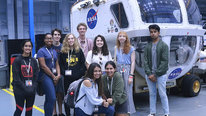March 2023: Developing Youth STEM Change Makers - Making a Difference!

Theme's playlist
Expert Panel

March Expert Panel: Developing Youth STEM Change Makers - Making a Difference!
Recorded: March 8, 2023 at 3pm EST
Description:Come join as we explore how youth can be actively engaged as STEM change makers, advancing DEI and social justice while addressing critical STEM challenges. In this interactive webinar we will explore the challenges, the benefits, and the impact of such exemplar programs and lessons learned for those interested in designing such efforts. We will hear from the leaders of four such efforts, as well as from some of the youth change agents who took part. Don't miss it!
Join the Discussion! View Recording &Bios
Discussion
Read the discussion related to this theme.Related Resources
Learn more about the CSO (Chief Science Officer) Program which advocates for Student Voice and Innovation in their communities. CSOs are students in grades 6-12 who are elected to serve as STEM ambassadors and a liaison for STEM opportunities in their communities. CSO Mentors are community leaders and professionals who serve as role models for STEM engagements.
ClimateChangeEducation.org is an organization of volunteers dedicated to education on climate change and global warming solutions -- since 1999. We are science museum docents, teachers, students, scientists, university staff, parents and artists. Most of us are in California (U.S.), but we have volunteers all over the world. The common thread in our work is to bring people and education programs together. We encourage educational institutions to utilize the best materials and resources available.
CLEAN is the Climate Literacy and Energy Awareness Network. Our primary efforts are: *to steward a reviewed collection of free, high-quality teaching materials for teaching climate and energy *to support the CLEAN Network, a community of professionals committed to improving climate and energy literacy.
The East Bay Academy for Young Scientists (EBAYS) provides opportunities for youth of all ages to enhance their critical thinking skills by conducting community-based, authentic scientific research that addresses pressing environmental and social concerns.
In this research and development project, we will develop and implement a trans-disciplinary family-based learning project utilizing a low-cost indoor (hydroponics) and technology enhanced learning kit (using Micro:bits and sensors) that will be provided to the families to support their learning and doing of science at home through the caring for, growing of, and monitoring of their own produce.
Using a qualitative methodological approach, the authors examined the development of trusting relationships between their educational research team and a series of urban science teachers after 3 years of partnerships. It was found that teachers were initially cautiously optimistic about working with the research team, not wanting to invest much effort in the partnership until the research team had proven they were open, honest, and, most importantly, dedicated to helping their students. It was also found that the process of trust building began with an initial tentative and hesitant frontstage persona and eventually progressed to the point where they felt comfortable dropping their frontstage mask to engage in backstage conversations.
(In progress) Adolescence is a critical time for the cultivation of life purpose, also known as a meaningful long-term aim focused on contribution to others. Youth with purpose, especially marginalized youth, report a number of positive outcomes. Relationships with caring adults appear to be particularly helpful in guiding young people on their path to purpose, but little work has focused specifically on the role of mothers. This qualitative study, approved by a Institutional Review Board, examines how twenty adolescents from marginalized communities describe their sense of purpose and its relationship to their caregivers.







